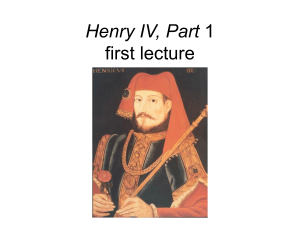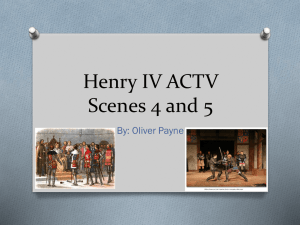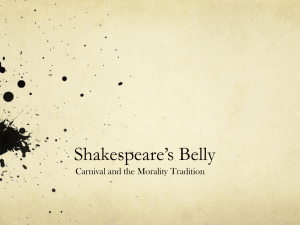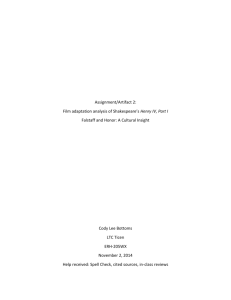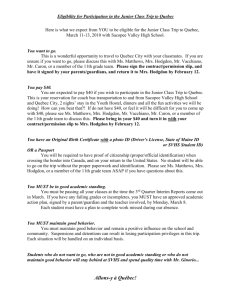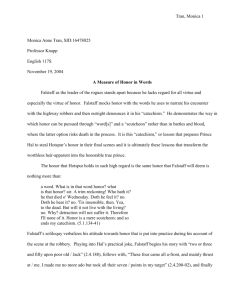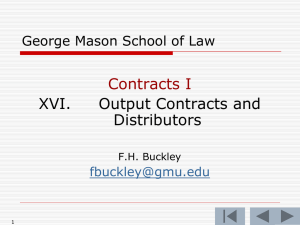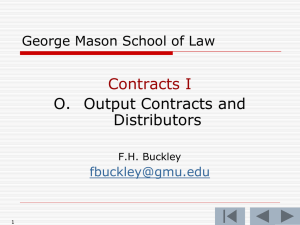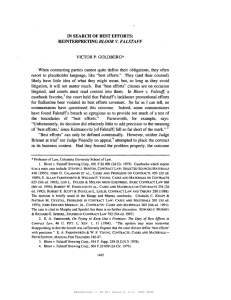Henry IV
advertisement
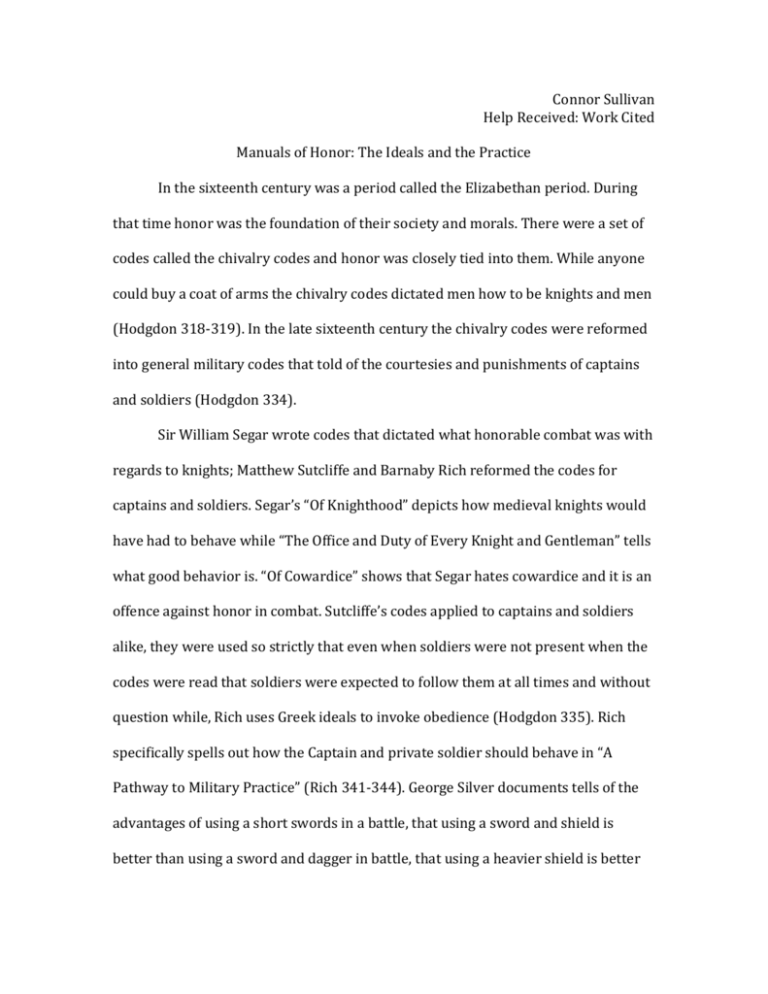
Connor Sullivan Help Received: Work Cited Manuals of Honor: The Ideals and the Practice In the sixteenth century was a period called the Elizabethan period. During that time honor was the foundation of their society and morals. There were a set of codes called the chivalry codes and honor was closely tied into them. While anyone could buy a coat of arms the chivalry codes dictated men how to be knights and men (Hodgdon 318-319). In the late sixteenth century the chivalry codes were reformed into general military codes that told of the courtesies and punishments of captains and soldiers (Hodgdon 334). Sir William Segar wrote codes that dictated what honorable combat was with regards to knights; Matthew Sutcliffe and Barnaby Rich reformed the codes for captains and soldiers. Segar’s “Of Knighthood” depicts how medieval knights would have had to behave while “The Office and Duty of Every Knight and Gentleman” tells what good behavior is. “Of Cowardice” shows that Segar hates cowardice and it is an offence against honor in combat. Sutcliffe’s codes applied to captains and soldiers alike, they were used so strictly that even when soldiers were not present when the codes were read that soldiers were expected to follow them at all times and without question while, Rich uses Greek ideals to invoke obedience (Hodgdon 335). Rich specifically spells out how the Captain and private soldier should behave in “A Pathway to Military Practice” (Rich 341-344). George Silver documents tells of the advantages of using a short swords in a battle, that using a sword and shield is better than using a sword and dagger in battle, that using a heavier shield is better than a lighter one because the lighter shield will not stand up to a face to face fight (Silver 344-348). There are several examples of exemplifying and contradicting honor in Shakespeare’s Henry IV (Part 1). Some of the characters provide both situations while others are only an example of one. Many of the examples will draw from Sir William Segar’s codes of honor; “Of Knighthood”, “The Office and Duty of Every Knight and Gentleman”, and “Of Cowardice.” The character that is being examined is Sir John Falstaff. He does not follow several of the codes of honor, the biggest infraction being from Segar’s “Of Cowardice.” When Douglas confronted Falstaff in battle and Falstaff instead of actually fighting Douglas falls to the floor and acted as if he were dead (V. iv. 113). In “Of Cowardice” it states that a kind of cowardice is to pretend to be sick and to leave their ranks, Falstaff does both of these by falling to the ground and pretending to be dead (Segar 337). That exemplifies what cowardice is but that is not the only thing Falstaff did in the play that was cowardly. Earlier in the play Falstaff refuses to give his sword to Prince Harry because he wanted to stab Hotspur (V. iii. 109). When Falstaff finally came across Hotspur while Prince Harry was fighting him Falstaff just stood by and pretended to be dead while Prince Harry won the fight. When Prince Harry left Falstaff got up and stabbed Hotspur in the leg and later claimed he had killed the valiant knight Hotspur (V. iv. 115). In Segar’s “Of Knighthood” it states that “[h]e should be well favored of face and comely…he should be sober, and discreet, not inclined to vain delights or effeminate pleasure…” but Falstaff does not abide by this at all (Segar 336). In the opening of Act I, Scene II Prince Harry’s description of Falstaff shows just how unknightly he is: Thou art so fat-witted with drinking of old sack, and unbuttoning thee after supper, and sleeping upon benches after noon, that thou hast forgotten to demand that truly which thou wouldst truly know. (I. ii. 24). In this quote it is obvious that Falstaff does not abide by the “Of Knighthood” codes that Segar wrote, but he also does not follow the code of “The Office and Duty of Every Knight and Gentleman.” Even a little later in the play Prince Harry makes it known that Falstaff indulges in prostitutes. Falstaff is almost always drunk, he is very sloth like, and he indulges in vain delight and other pleasures. He does not defend his prince courageously; he leaves him on the battlefield with no sword and doesn’t help Prince Harry fight Hotspur (V. iv. 113). He is definitely not honest and that is evident in the amount of stories he has fabricated. He does desire excessive riches so much so that he steals it from others (II. ii. 45). Sir John Falstaff is not by any means an honorable knight. He is extremely selfish and not at all kind towards others. He has no sense of honor or integrity and at the end of the play he calls honor useless because it did not save Sir Walter Blunt’s life (V. iii. 108-109). Falstaff does not follow the codes of honor and chivalry that were common at the time Shakespeare wrote the play; how he was knighted it will never be understood. Works Cited Hodgdon, Barbara. The First Part of King Henry the Fourth. By William Shakespeare. Boston: Bedford Books, 1997. Print. Rich, Barnaby. A Pathway to Military Practice. The First Part of King Henry the Fourth. By William Shakespeare. Ed. Barbara Hodgdon. Boston: Bedford Books, 1997. Print. Segar, William. Honor Military and Civil. The First Part of King Henry the Fourth. By William Shakespeare. Ed. Barbara Hodgdon. Boston: Bedford Books, 1997. Print. Shakespeare, William. The First Part of King Henry the Fourth. Ed. Barbara Hodgdon. Boston: Bedford Books, 1997. Print. Silver, George. The Paradoxes of Defense. The First Part of King Henry the Fourth. By William Shakespeare. Ed. Barbara Hodgdon. Boston: Bedford Books, 1997. Print. Sutcliffe, Matthew. The Right Practice, Proceedings, and Laws of Arms. The First Part of King Henry the Fourth. By William Shakespeare. Ed. Barbara Hodgdon. Boston: Bedford Books, 1997. Print.
